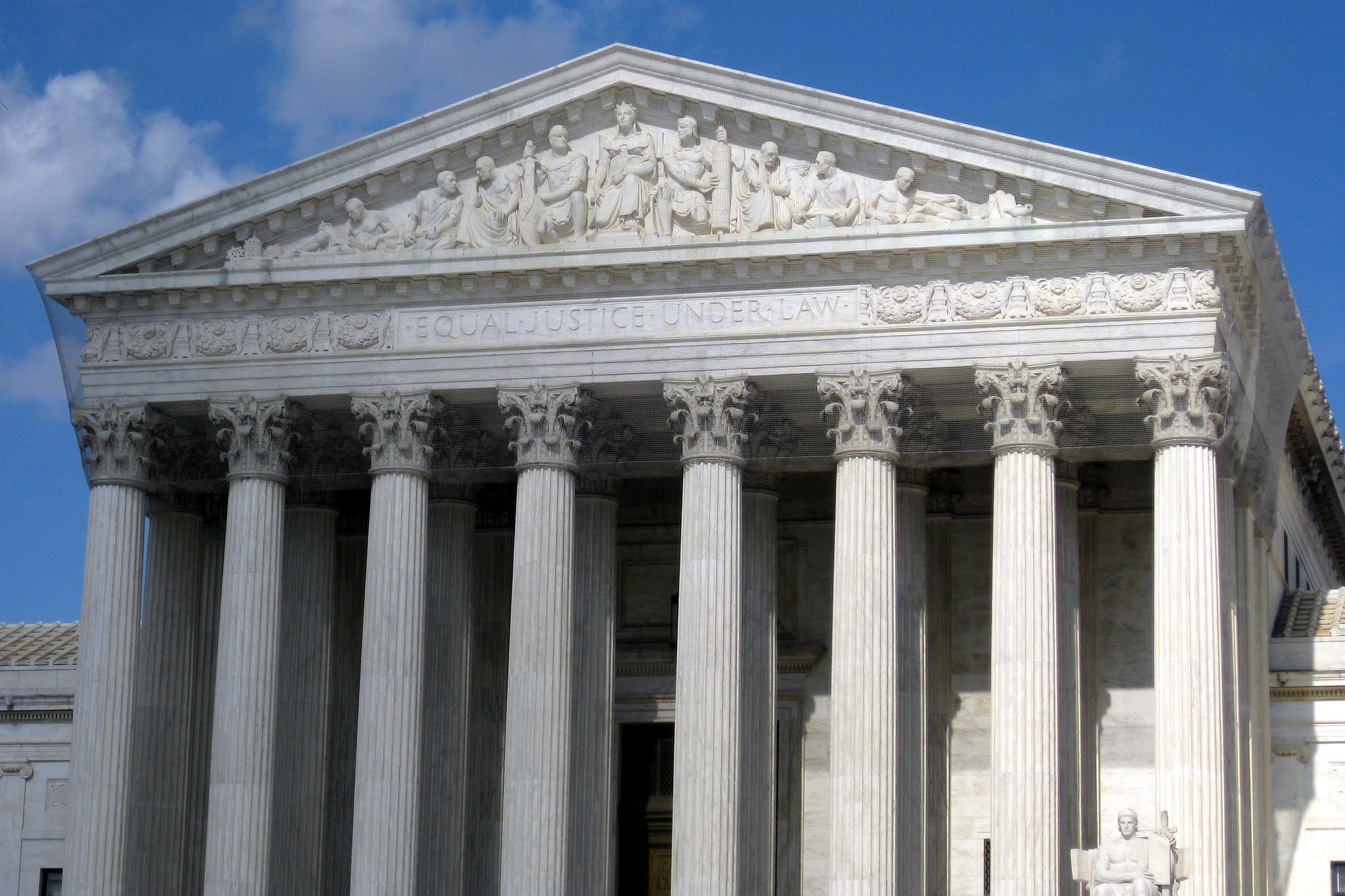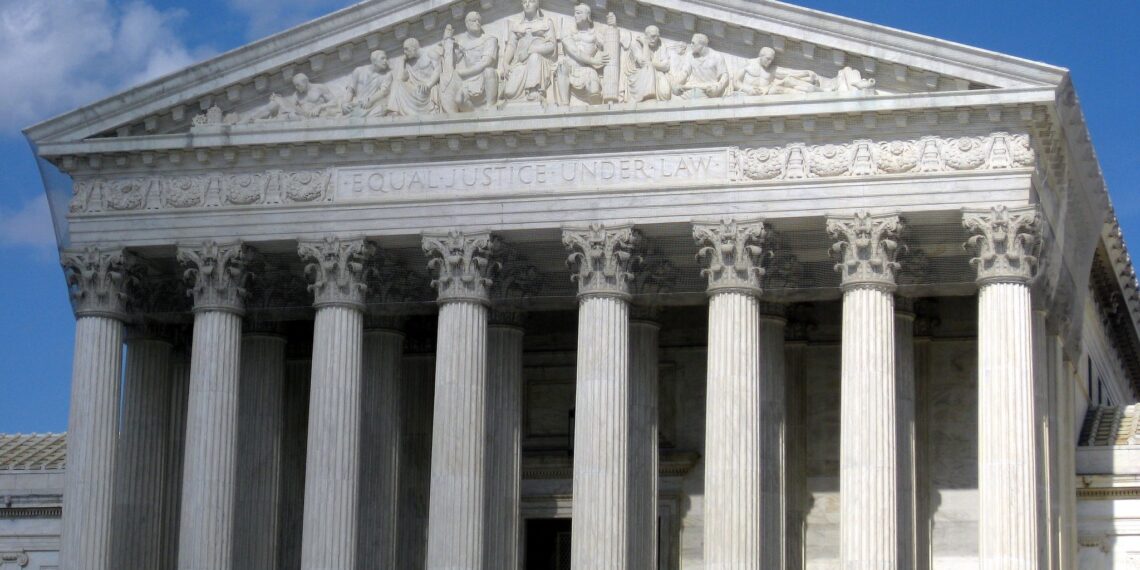[ad_1]
ARGUMENT ANALYSIS
on Jan 8, 2024
at 8:08 pm

The justices heard oral argument FBI v. Fikre on Monday. (Wally Gobetz via Flickr)
The Supreme Court on Monday heard oral argument in a dispute over whether a lawsuit filed by an Oregon man who was placed on the No Fly List can go forward when the government has removed him from the list and pledged not to return him to it “based on the currently available information.” After over an hour of debate, some justices appeared ready to adopt a middle ground that would task federal trial judges with determining, based on a private review of the government’s evidence, whether someone who was once on the list but has been removed is likely to be returned to the list.
The plaintiff in the case is Yonas Fikre, a U.S. citizen of Eritrean descent. In 2010, while he was living in Sudan, Fikre learned that he had been placed on the list. A few months later, when he flew to the United Arab Emirates, he was arrested, imprisoned, and tortured. He later made his way to Sweden, where he applied for asylum, but the Swedish government instead returned him to the United States on a private plane.
Fikre filed a lawsuit in federal court in Oregon in 2013, alleging that the FBI violated his constitutional rights when it placed him on the No Fly List. But after the FBI removed him from the list and pledged not to put him on the list again “based on the currently available information,” the district court dismissed his case as moot – that is, no longer a live controversy.
The U.S. Court of Appeals for the 9th Circuit revived Fikre’s lawsuit, prompting the FBI to come to the Supreme Court last year.
Representing the FBI, Assistant to the U.S. Solicitor General Sopan Joshi urged the justices to hold that the case is moot. He emphasized that Fikre is not currently on the No Fly List, hasn’t been on it for eight years, and won’t be returned to the list based on the information currently available to the FBI. “There simply isn’t a live case or controversy there any longer.”
Joshi added that when the justices should not interpret the exceptions to mootness – such as here, when the defendant voluntarily stops the conduct that led to the lawsuit – they should keep in mind the purpose of those exceptions, which is to avoid a scenario in which the defendant can evade review simply by ceasing the objectionable conduct. But that is not the scenario here, Joshi stressed, because Fikre was taken off “because he no longer posed a threat of engaging” in terrorism.
Several justices expressed concern about how either Fikre or a judge reviewing the government’s mootness claim would determine whether Fikre was in fact likely to be returned to the No Fly List. Justice Clarence Thomas was the first to raise this point, asking Joshi how Fikre would “know a year from now if he is on the list with the same procedures or different procedures or different facts when he doesn’t know why he was on the list in the first instance?”
Joshi outlined the factors on which the government relies to make that determination but allowed that “the information on which that determination is based is classified,” so that the government doesn’t disclose it “for obvious reasons. It’s based on a totality of information at the time the decision is made.”
Justice Elena Kagan asked whether the government should be required to go before a judge in private to explain why someone had been placed on the No Fly List, why they had been removed from the list, and why they would not be returned to the list.
Joshi acknowledged that the FBI uses a similar strategy to deal with the merits of challenges to placements on the No Fly List, but he told the justices that he was “hesitant to embrace that kind of solution.” In particular, he observed, even revealing classified or sensitive information to a federal judge could harm national security interests. And he questioned whether courts were capable of making the kind of predictive judgment that such an inquiry requires.
But Justice Neil Gorsuch also appeared to embrace Kagan’s proposed solution. He noted that Fikre, as a U.S. citizen, “normally has a right to what’s been called every man’s evidence against him. That’s due process. That’s a pillar of our democracy.” He indicated that the government uses a comparable approach in other cases involving national security. “Why is it too much to expect,” Gorsuch queried, “to an American citizen who’s been denied every man’s evidence … when his fundamental liberty, the right to travel, is at stake?”
Justice Brett Kavanaugh was more sympathetic to the FBI’s concerns about disclosing sensitive information. But he too was concerned about how courts should determine whether someone like Fikre was likely to be placed on the list again “because we just have no idea” about the underlying facts.
Justice Samuel Alito had a slightly different concern. Calling the dispute a “very perplexing case,” he observed that, to show that the case is moot, the FBI would have to demonstrate that it is very unlikely that Fikre won’t be returned to the list. But in addition to the concerns about how courts should make that determination without knowing the facts that led to Fikre’s listing or removal, he pointed out that Fikre also needed to show that he has a legal right to sue, known as standing. That is hard to do, Alito suggested, when his claim that he will be returned to the list is “entirely speculative.”
Representing Fikre, lawyer Gadeir Abbas asked the justices to uphold the 9th Circuit’s ruling that Fikre’s case is not moot. The FBI, Abbas said, needs to “make absolutely clear that the conduct could not reasonably be expected to recur.” But the government has merely promised Fikre “that he won’t be put back on the No Fly List based on currently available information,” a pledge that Abbas deemed “inadequate.”
Chief Justice John Roberts, however, suggested that the government’s promise might be enough. It “surely would be irresponsible for the government to say we’re not going to put him on the No Fly List no matter what,” Roberts said. “I don’t see how you can ask them to say anything more than what they already said.”
Alito pressed Abbas to make clear precisely what he is seeking from the government. Do you want an advisory opinion, Alito asked, indicating – for example – what countries would result in Fikre’s being returned to the list if he were to visit them?
Abbas acknowledged that it is a “difficult fact-intensive question,” but he suggested that he was seeking a more general injunction. “Perhaps,” he posited, the government would be required to show that someone had been placed on the list as a result of criminal conduct.
Alito expressed surprise, indicating that such a requirement would be a “huge change” from the current practice, and Kavanaugh chimed in to say that it would be “dramatic.”
When the argument wrapped up a few minutes later, it seemed very possible that the court will eventually reach a result that will not necessarily satisfy either side.
A decision is expected by summer.
This article was originally published at Howe on the Court.
[ad_2]



